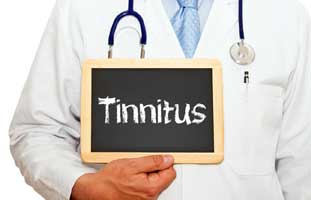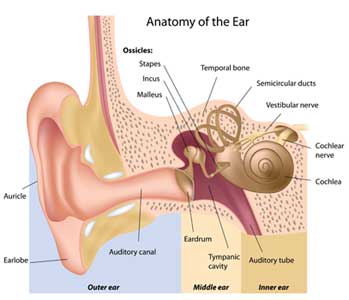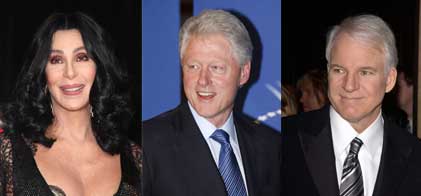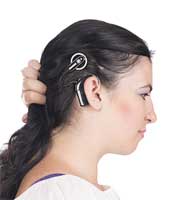 If you are experiencing a constant ringing in the ears, you may be one of the 50 million Americans who have tinnitus. Tinnitus is the medical term for ringing in the ears and is defined as hearing noises in your ears that have no outside source. These noises may be heard as ringing, buzzing, hissing, whistling, roaring, blowing, sizzling or even humming.
If you are experiencing a constant ringing in the ears, you may be one of the 50 million Americans who have tinnitus. Tinnitus is the medical term for ringing in the ears and is defined as hearing noises in your ears that have no outside source. These noises may be heard as ringing, buzzing, hissing, whistling, roaring, blowing, sizzling or even humming.
It often sounds like a high-pitched, constant ringing in the ears, either softly or loudly. Ringing in one ear is common, but tinnitus can also be experienced in both ears or inside the head. Most tinnitus suffers are aware of the ringing in their ears but tend to find it worse when trying to fall asleep, or when they are sitting in a quiet room or background noise is fairly low.
Example of what ringing in the ears sounds like.
What Causes Ringing in the Ears?

Approximately 90% of individuals with tinnitus have some level of hearing loss, which may have variable causes. However, the most common cause of tinnitus is prolonged exposure to loud sounds such as music, gunshots or even landscaping equipment like chainsaws. These high-volume sounds often cause permanent damage to the cochlea hair cells, which are sound sensitive cells found in the spiral-shaped organ in the inner ear.
Unfortunately, prolonged exposure to loud sounds is not the only way that someone can hear ringing in the ears. In some cases, a one-time exposure to an extremely loud sound can also cause tinnitus.
Additional Causes of Tinnitus
Beyond contact with high-volume sounds, tinnitus can also be caused by the following illnesses or conditions:
- – Deterioration of the cochlea (or other parts of the ear) due to the natural aging process
- – TMJ syndrome (temporomandibular joint), which also results in jaw and neck problems
- – Diabetes
- – High blood pressure
- – Allergies
- – Circulatory issues
- – Anemia
- – Cardiovascular disease
- – Under-active thyroid gland
- – Certain prescription and nonprescription drugs such as aspirin, anti-inflammatories, antidepressants, antibiotics
- – Neck or head injuries
- – Ear infection
- – Meniere’s disease
- – Otosclerosis
- – Benign tumor of the auditory nerve
- – Ear blockages due to wax buildup
People Affected by Tinnitus
Twenty-six million Americans between the ages of 20 and 69 are reported to have high-frequency hearing loss, and many of those affected by ringing in the ears have occupations that require consistent exposure to loud sounds. Such occupations often include musicians, construction and landscape workers, pilots or members of the military. In fact, the most frequent disability of the Iraq and Afghanistan wars is tinnitus and hearing loss, with 60% of veterans returning home with these conditions.
Men are more likely to suffer from ringing in the ears than women, and the national average indicates that adults 55 years of age and older are the majority of those who suffer from tinnitus. But studies from the U.S. Department of Health and Human Services suggest that hearing problems among 45- to 64-year-olds increased 26% over a 30-year period from 1971 to 1990, indicating the average age of a tinnitus suffer is on the rise.
Many celebrities suffer from tinnitus, including Bono, Barbra Streisand, William Shatner, Steve Martin, Cher, Cheryl Tiegs, Will.i.am, Sylvester Stallone, Bill Clinton, David Letterman, Pete Townshend, Eric Clapton and many more.

Remedies for Ringing in the Ears
Luckily, several natural remedies and lifestyle changes can result in lessened tinnitus. While there is currently no cure for tinnitus, the following remedies may help:
- – Avoid fatigue and stress
- – Get a good night’s sleep
- – Increase GABA levels and reduce stress by taking a yoga class
- – Avoid caffeinated drinks or limit the intake of them
- – Strictly control salt consumption
- – Limit exposure to loud sounds
- – Turn down the volume on headphones and speakers
- – Avoid alcohol consumption
- – Refrain from smoking cigarettes
- – Engage in acupuncture therapy
- – Lower your cholesterol
- – Have an active exercise routine
- – Eat a proper diet
- – Avoid excitatory neurotoxins such as aspartame and monosodium glutamate (MSG)
Tinnitus Treatments
In conjunction with the above mentioned tinnitus remedies, there are several forms of tinnitus treatments available to reduce ringing in the ears.
-
Tinnitus Medications And Supplements
Serving as a natural tinnitus treatment, tinnitus medications such as the Arches Tinnitus Formula™ and Arches Tinnitus Combo Pack work with the body to significantly reduce ringing in the ears. Derived from natural botanical ingredients such as Zinc and Ginkgo biloba, these tinnitus supplements offer an effective and less invasive tinnitus treatment.
-
Hearing Aids
For tinnitus suffers with hearing loss, hearing aids offer the possibility of returning ambient sounds that naturally cover the ringing of tinnitus. This tinnitus treatment can potentially offer partial tinnitus relief.
-
Cochlear Implants

According to the American Tinnitus Association, cochlear implants are only recommended for patients with total or near deafness. The implant sends sound signals to the brain, and one study concluded that half of cochlear implant patients who had reported tinnitus before the implant experienced proven tinnitus relief.
-
Counseling/Therapy
CBT, or cognitive behavioral therapy, works best when coupled with other tinnitus treatments such as natural supplements or masking devices. Unlike other tinnitus treatments that focus on the tinnitus itself, CBT works with patients to change their perception of the ringing in their ears.
-
Sound Machines/Masking Devices
Several tinnitus treatments utilize sound machines to assist in masking tinnitus through the use of white noise or running water. Sound machines or masking devices can be found in several different forms, including tabletop apparatuses or wearable headbands.
-
Neural Stimulation
Many doctors believe that targeted nerve stimulation produces significant tinnitus relief. This treatment, in essence, is meant to retrain the brain to disregard ringing in the ears that is simulated by nerve signals.
When to Contact Your Doctor
Of the 50 million Americans affected by tinnitus, 15 million annually seek medical attention from an Ear, Nose and Throat doctor (Otolaryngologist). If ringing in the ears persists, worsens, it is recommended to seek medical treatment and diagnosis from a physician, specifically an ENT. While there is no cure for tinnitus, a doctor should be able to help ascertain the causes behind ringing in the ears and assist you in determining the proper method of remedies and tinnitus treatments to take.
Additional resources:
- Arches Tinnitus Library
- ATA.org
- Hearing Health Foundation
- American Hearing
- National Institute for Deafness and Other Communication Disorders (NIDCD)
Get Free Shipping!
Order now and get free shipping on either the Tinnitus Starter Kit or Combo Pack. Try the doctor recommended products with clinically proven ingredients for tinnitus. No coupon code required.

